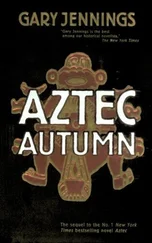Gary Jennings - Aztec
Здесь есть возможность читать онлайн «Gary Jennings - Aztec» весь текст электронной книги совершенно бесплатно (целиком полную версию без сокращений). В некоторых случаях можно слушать аудио, скачать через торрент в формате fb2 и присутствует краткое содержание. Жанр: Старинная литература, на английском языке. Описание произведения, (предисловие) а так же отзывы посетителей доступны на портале библиотеки ЛибКат.
- Название:Aztec
- Автор:
- Жанр:
- Год:неизвестен
- ISBN:нет данных
- Рейтинг книги:4 / 5. Голосов: 1
-
Избранное:Добавить в избранное
- Отзывы:
-
Ваша оценка:
- 80
- 1
- 2
- 3
- 4
- 5
Aztec: краткое содержание, описание и аннотация
Предлагаем к чтению аннотацию, описание, краткое содержание или предисловие (зависит от того, что написал сам автор книги «Aztec»). Если вы не нашли необходимую информацию о книге — напишите в комментариях, мы постараемся отыскать её.
"Anyone who reads, anyone who still lusts for adventure or that book you can't put down, will glory in Aztec."--Los Angeles Times
Aztec
Aztec
Aztec — читать онлайн бесплатно полную книгу (весь текст) целиком
Ниже представлен текст книги, разбитый по страницам. Система сохранения места последней прочитанной страницы, позволяет с удобством читать онлайн бесплатно книгу «Aztec», без необходимости каждый раз заново искать на чём Вы остановились. Поставьте закладку, и сможете в любой момент перейти на страницу, на которой закончили чтение.
Интервал:
Закладка:
The sky had been clouding over for some time, and now the rain came, in the usual manner of the days of our wet season—a storm like the end of the world: many-forked sticks of lightning, drum rolls of thunder, and a deluge of rain as if it would never end. But end it always did, in no longer time than a man would take for a pleasant afternoon nap; in time for Tonatíu, or Tezcatlipóca, to shine again on a wet-sparkling world, to make it steam, to make it dry and warm again before he set. When the rain came, now, I had already taken shelter on one of the stair landings which had a bench protected by a roof thatch. While I sat out the storm, I meditated on the numerical significance of the-zigzagging staircase, and I smiled at the ingenuity of whoever had designed it.
Like you white men, we in these lands lived by a yearly calendar based on the sun's traversing the sky. Thus our solar year, like yours, consisted of three hundred sixty and five days, and we used that calendar for all ordinary purposes: to tell us when to plant which seeds, when to expect the rainy season, and so forth. We divided that solar year into eighteen months of twenty days apiece, plus the nemontemtin—the "lifeless days," the "hollow days"—the five days required to round out the three hundred sixty and five of the year.
However, we also observed an alternate calendar based not on the sun's daytime excursions but on the nightly appearance of the brilliant star we named for our ancient god Quetzalcoatl, or Feathered Serpent. Sometimes Quetzalcoatl served as the After Blossom which blazed immediately after sunset; at other times he moved to the other side of the sky, where he would be the last star visible as the sun rose and washed away all the others. Any of our astronomers could explain all this to you, with great diagrams, but I have never been very good at astronomy. I do know that the movements of the stars are not as random as they would seem, and that our ceremonial calendar was somehow based on the movements of the star named for Quetzalcoatl. That calendar was useful even to our ordinary folk, for naming their newborn children. Our historians and scribes used it for dating notable happenings and the length of our rulers' reigns. More important, our seers used it to divine the future, to warn against impending calamities, to select auspicious days for weighty undertakings.
In the divinatory calendar, each year contained two hundred sixty days, those days named by appending the numbers one through thirteen to each of twenty traditional signs: rabbit, reed, knife, and so on—and each solar year was itself named according to the ceremonial number and sign of its first day. As you can perceive, our solar and ritual calendars were forever overlapping each other, one lagging behind or forging ahead of the other. But, if you care to do the arithmetic involved, you will find that they balanced out at an equal number of days over a total of fifty and two of the ordinary solar years. The year of my birth was called Thirteen Rabbit, for example, and no later year bore that same name until my fifty-second came around.
So, to us, fifty and two was a significant number—a sheaf of years, we called it—since that many years were simultaneously recognized by both calendars, and since that many years were more or less what the average man could expect to live, barring accident, illness, or war. The stone staircase winding up Texcotzinco Hill, with its thirteen steps between landings, denoted the thirteen ritual numbers, and with its fifty and two steps between terraces, denoted a sheaf of years. When I eventually got to the top of the hill I had counted five hundred and twenty steps. All together, they denoted two of the ceremonial years of two hundred sixty days apiece, and likewise stood for ten sheaves of fifty and two years. Yes, most ingenious.
When the rain stopped, I continued my climb. I did not go up all the rest of those stairs in one headlong dash, though I am sure I could have, in those days of my young strength. I halted at each remaining landing only long enough to see if I could identify the god or goddess whose statue stood there. I knew perhaps half of them: Tezcatlipóca, the sun, chief god of the Acolhua; Quetzalcoatl, of whom I have spoken; Ometecutli and Omeciuatl, our Lord and Lady Pair....
I stopped longer in the gardens. There on the mainland the soil was ample and the space unlimited, and Nezahualpili was evidently a man who loved flowers, flowers everywhere. The hillside gardens were laid out in neat beds, but the terraces were not trammeled by walls. So the flowers spilled generously over the edges, and the trailing varieties dangled their brilliant blooms almost as far down the hill as the next lower terrace. I know I saw every flower I had ever previously seen in my life, besides countless kinds that I never had, and many of those must have been expensively transplanted from far countries. I also gradually realized that the numerous lily ponds, the reflecting pools, the fish ponds, the chuckling brooks and cascades were a watering system fed by the fall of gravity from some source atop the hill.
If the Lord Strong Bone was climbing behind me, I never caught sight of him. But, in one of the higher terrace gardens, I came upon another man, lolling on a stone bench. As I approached near enough to see him fairly clearly—the wrinkled cacao nut-brown skin, the ragged loincloth that was his only garment—I remembered having met him before. He stood up, at least to the extent of his hunched and shrunken stature. I had grown taller than he was.
I gave him the traditionally polite greeting, but then said, probably more rudely than I intended it to sound, "I thought you were a Tlaltelólco beggar, old man. What do you here?"
"A homeless man is at home anywhere in the world," he said, as if it were something to be proud of. "I am here to welcome you to the land of the Acolhua."
"You!" I exclaimed, for the grotesque little man was even more of an excrescence in that luxuriant garden than he had been in the motley market crowd.
"Were you expecting to be greeted by the Revered Speaker in person?" he asked, with a mocking, gap-toothed grin. "Welcome to the palace of Texcotzinco, young Mixtli. Or young Tozani, young Malinqui, young Poyautla, as you like."
"Long ago you knew my name. Now you know all my nicknames."
"A man with a talent for listening can hear even things not yet spoken. You will have still other names in time to come."
"Are you really a seer, then, old man?" I asked, unconsciously echoing my father's words of years before. "How did you know I was coming here?"
"Ah, your coming here," he said. "I pride myself that I had some small part in arranging that."
"Then you know a good deal more than I do. I would be grateful for a bit of explanation."
"Know, then, that I never saw you before that day in Tlaltelólco, when I overheard the mention that it was your naming day. Out of mere curiosity, I took the opportunity for a closer look at you. When I inspected your eyes, I detected their imminent and increasing loss of distant vision. That affliction is sufficiently uncommon that the distinctive shape of the afflicted eyeball affords an unmistakeable sign diagnostic. I could say with certainty that you were fated to see things close and true."
"You also said I would speak truly of such things."
He shrugged. "You seemed bright enough, for a brat, that it was safe to predict you would grow up passably intelligent. A man who is forced by weak eyesight to regard everything in this world at close range, and with good sense, is also usually inclined to describe the world as it really is."
"You are a cunning old trickster," I said, smiling. "But what has all that to do with my being summoned to Texcóco?"
"Every ruler and prince and governor is surrounded by servile attendants and self-seeking wise men who will tell him what he wants to hear, or what they want him to hear. A man who will tell only the truth is a rarity among courtiers. I believed that you would become such a rarity, and that your faculties would be better appreciated at a court rather nobler than that of Xaltócan. So I dropped a word here and there..."
Читать дальшеИнтервал:
Закладка:
Похожие книги на «Aztec»
Представляем Вашему вниманию похожие книги на «Aztec» списком для выбора. Мы отобрали схожую по названию и смыслу литературу в надежде предоставить читателям больше вариантов отыскать новые, интересные, ещё непрочитанные произведения.
Обсуждение, отзывы о книге «Aztec» и просто собственные мнения читателей. Оставьте ваши комментарии, напишите, что Вы думаете о произведении, его смысле или главных героях. Укажите что конкретно понравилось, а что нет, и почему Вы так считаете.











